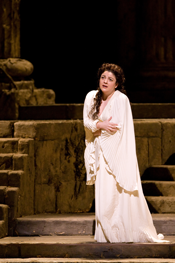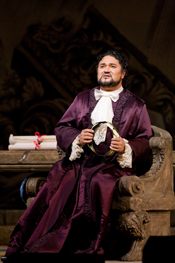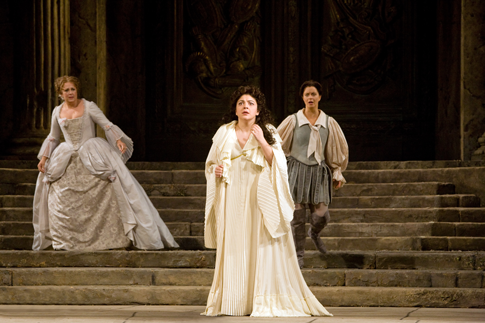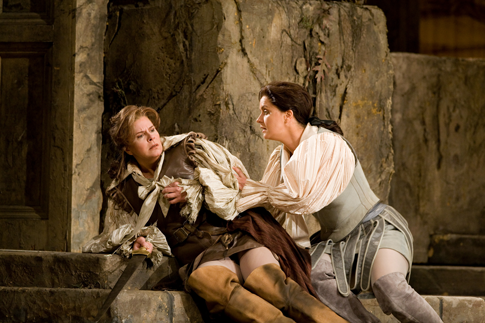![Susan Graham as Sesto (Clemenza di Tito) [Photo: Marty Sohl courtesy of The Metropolitan Opera]](http://www.operatoday.com/Graham_Clemenza_Met.png)
13 May 2008
Ponnelle Clemenza remains a masterpiece
Opera companies should practice historic preservation, keeping certain productions forever in the repertory because of their quality and aesthetic value.
English Touring Opera are delighted to announce a season of lyric monodramas to tour nationally from October to December. The season features music for solo singer and piano by Argento, Britten, Tippett and Shostakovich with a bold and inventive approach to making opera during social distancing.
This tenth of ten Live from London concerts was in fact a recorded live performance from California. It was no less enjoyable for that, and it was also uplifting to learn that this wasn’t in fact the ‘last’ LfL event that we will be able to enjoy, courtesy of VOCES8 and their fellow vocal ensembles (more below …).
Ever since Wigmore Hall announced their superb series of autumn concerts, all streamed live and available free of charge, I’d been looking forward to this song recital by Ian Bostridge and Imogen Cooper.
Although Stile Antico’s programme article for their Live from London recital introduced their selection from the many treasures of the English Renaissance in the context of the theological debates and upheavals of the Tudor and Elizabethan years, their performance was more evocative of private chamber music than of public liturgy.
Evidently, face masks don’t stifle appreciative “Bravo!”s. And, reducing audience numbers doesn’t lower the volume of such acclamations. For, the audience at Wigmore Hall gave soprano Elizabeth Llewellyn and pianist Simon Lepper a greatly deserved warm reception and hearty response following this lunchtime recital of late-Romantic song.
For this week’s Live from London vocal recital we moved from the home of VOCES8, St Anne and St Agnes in the City of London, to Kings Place, where The Sixteen - who have been associate artists at the venue for some time - presented a programme of music and words bound together by the theme of ‘reflection’.
'Such is your divine Disposation that both you excellently understand, and royally entertaine the Exercise of Musicke.’
‘And there was war in heaven: Michael and his angels fought against the dragon; and the dragon fought and his angels, And prevailed not; neither was their place found any more in heaven … that old serpent … Satan, which deceiveth the whole world: he was cast out into the earth, and his angels were cast out with him.’
There was never any doubt that the fifth of the twelve Met Stars Live in Concert broadcasts was going to be a palpably intense and vivid event, as well as a musically stunning and theatrically enervating experience.
‘Love’ was the theme for this Live from London performance by Apollo5. Given the complexity and diversity of that human emotion, and Apollo5’s reputation for versatility and diverse repertoire, ranging from Renaissance choral music to jazz, from contemporary classical works to popular song, it was no surprise that their programme spanned 500 years and several musical styles.
The Academy of St Martin in the Fields have titled their autumn series of eight concerts - which are taking place at 5pm and 7.30pm on two Saturdays each month at their home venue in Trafalgar Square, and being filmed for streaming the following Thursday - ‘re:connect’.
The London Symphony Orchestra opened their Autumn 2020 season with a homage to Oliver Knussen, who died at the age of 66 in July 2018. The programme traced a national musical lineage through the twentieth century, from Britten to Knussen, on to Mark-Anthony Turnage, and entwining the LSO and Rattle too.
With the Live from London digital vocal festival entering the second half of the series, the festival’s host, VOCES8, returned to their home at St Annes and St Agnes in the City of London to present a sequence of ‘Choral Dances’ - vocal music inspired by dance, embracing diverse genres from the Renaissance madrigal to swing jazz.
Just a few unison string wriggles from the opening of Mozart’s overture to Le nozze di Figaro are enough to make any opera-lover perch on the edge of their seat, in excited anticipation of the drama in music to come, so there could be no other curtain-raiser for this Gala Concert at the Royal Opera House, the latest instalment from ‘their House’ to ‘our houses’.
"Before the ending of the day, creator of all things, we pray that, with your accustomed mercy, you may watch over us."
The doors at The Metropolitan Opera will not open to live audiences until 2021 at the earliest, and the likelihood of normal operatic life resuming in cities around the world looks but a distant dream at present. But, while we may not be invited from our homes into the opera house for some time yet, with its free daily screenings of past productions and its pay-per-view Met Stars Live in Concert series, the Met continues to bring opera into our homes.
Music-making at this year’s Grange Festival Opera may have fallen silent in June and July, but the country house and extensive grounds of The Grange provided an ideal setting for a weekend of twelve specially conceived ‘promenade’ performances encompassing music and dance.
There’s a “slide of harmony” and “all the bones leave your body at that moment and you collapse to the floor, it’s so extraordinary.”
“Music for a while, shall all your cares beguile.”
The hum of bees rising from myriad scented blooms; gentle strains of birdsong; the cheerful chatter of picnickers beside a still lake; decorous thwacks of leather on willow; song and music floating through the warm evening air.
![Susan Graham as Sesto (Clemenza di Tito) [Photo: Marty Sohl courtesy of The Metropolitan Opera]](http://www.operatoday.com/Graham_Clemenza_Met.png)
Opera companies should practice historic preservation, keeping certain productions forever in the repertory because of their quality and aesthetic value.
Jean-Pierre Ponnelle’s 1984 staging of La Clemenza di Tito that returned to the stage of New York’s Metropolitan Opera in May would be an obvious candidate for such preservation.
The opening scene of this production of Mozart’s last opera is sufficient to identify Ponnelle as a major master of his profession. Clemenza, the last significant work of opera seria, is a work mammoth both in its dimensions and its emotions. Ponnelle’s recreation of first-century Rome at its colossal height brings to mind Winckelmann’s characterization of the art of antiquity as “noble simplicity and calm grandeur.”
 Tamar Iveri as Vitellia
Tamar Iveri as Vitellia
Ponnelle’s Rome — it fills the Met’s mammoth stage — is grand in
its columns, arches, balconies and stairs, and if a certain amount of decay
is evident, these fissures are only a reflection of the dysfunctional figures
in this drama of treachery and treason, all more interesting as character
studies than as living humans. For in opera seria it is the drama within that
is of the essence, and arias are largely confessional. Play the first scene
of Don Giovanni on an empty stage in street clothes and you have
more absorbing action than in the entire three hours of Clemenza.
Happily Ponnelle understood this and designed sets and beautifully painted, luminous scrims that are drained of color and serve as a perfect environment for the half a dozen ill-focused people all seemingly in love with an inappropriate — or unavailable — mate.
Only recently has Clemenza, written for the 1791 Prague coronation of Joseph II of Austria as emperor of Bohemia, come to be regarded as worthy of staging. For over a century, scholars apologized for the opera — a by-product of The Magic Flute and the Requiem, a work written in great haste. Some accounts assert that Mozart composed it in 18 days and assigned the recitatives to his pupil Franz Xaver Süssmayr. The fact that opera seria was already out of fashion when Mozart wrote Clemenza further complicates its place in history.
 Ramón Vargas as Tito
Ramón Vargas as Tito
All this was no problem for Ponnelle, who recognized the quality of the
music that Mozart had written and took his cues from the score in making the
opera an impressing experience on stage. For the revival the Met came up with
an ideal cast that — no matter what the title says — was headed by Susan
Graham, who — now in her late 40s — remains the reigning mezzo of her
generation. As Sesto, Graham’s combination of vocal and acting gifts —
plus her stature of almost six feet — makes it difficult to see this best
friend — and almost assassin — of Emperor Tito as the weak-willed
courtier described in opera guides.
Magnificent in everything she does, Graham stole the show in the packed performance on May 6 and no doubt did much to inspire those on stage with her. (For the Prague premiere castrato Domenico Bedini was brought from Italy to sing Sesto.)
 Heidi Grant Murphy (Servilia), Tamar Iveri (Vitellia) and Anke Vondung (Annio)
Heidi Grant Murphy (Servilia), Tamar Iveri (Vitellia) and Anke Vondung (Annio)
Ramón Vargas, the Met’s Rodolfo of the season, brought baritone heft to
his portrayal of Tito, whose ability to forgive even those who would have
killed him gives the opera its title.
Most difficult figure in the cast is Vitellia, the rotten apple without whom there would be no story. (The worm at her core was planted there, of course, by Tito, who unjustly usurped power from Vitellia’s father.) For Georgian soprano Tamar Iveri the changing moods of the woman determined to kill Tito if she could not marry him were handled with enviable ease.
Servilia and Annio, the innocent young lovers who barely manage to stay out of the way of the machinations of others, were lovingly sung by Heidi Grant Murphy and Anke Vondung. Bass Oren Gradus brought dignity to Tito‘s advisor Publio.
Responsible for much of the success of the revival was the conducing of England’s Harry Bicket, a young man seen with increasing frequency in opera houses and with orchestras on this side of the Atlantic. Bicket, a leading authority on early opera, seemed to relish Mozart’s extensive use of the clarinet in the score. (The instrument was still largely alien to classical orchestras in this year of Mozart’s death.)
 Susan Graham (Sesto) and Anke Vondung (Annio)
Susan Graham (Sesto) and Anke Vondung (Annio)
As stage director of the revival Laurie Feldman was marvelously loyal to
Ponnelle’s intentions.
The overall excellence of the Met performance sharply contradicts the opinion of Leopold’s Spanish-born throne-mate who at the premiere found Clemenza “German hogwash.” But above all it was Ponnelle’s wisdom in taking the opera at face value rather than trying to make of Clemenza something that it is not who deserves the highest praise of the success of the staging.
Wes Blomster